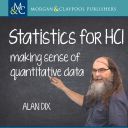Bayesian statistics uses Bayesian reasoning as an alternative to traditional statistics, such as significance testing or confidence intervals. Crucially this demands that you make precise your prior belief about the outcomes encoding (belief) as probability. In some cases your belief will be based on existing data or evidence; in these cases Bayes rule gives a strong mathematical foundation, yielding a precise posterior probability given the additional evidence. More commonly the prior is a guesstimate or subjective assessment and the posterior probability is not really a probability, but rather evidence-based belief.
Used in pages 4, 8, 15, 57, 60, 69, 72, 74, 75, 77, 78, 79, 80, 81, 82, 92, 93, 95, 97, 98, 100, 101, 102, 105, 142
Also known as bayesian statistical methods, bayesian stats
